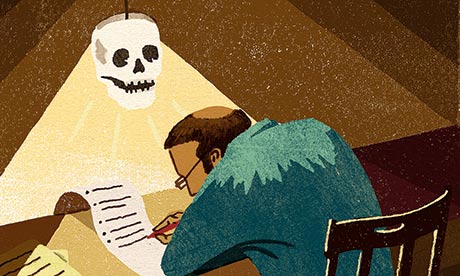
What will you regret when you're lying on your deathbed? (Apart from buying a deathbed in the first place, obviously – that was asking for trouble.) The question gnaws deeply at many of us, as shown by what happens whenever actual dying people speak of their actual regrets: a Guardian article on the topic, based on the experiences of a palliative care nurse named Bronnie Ware, has now been read by several million people. "I wish I hadn't worked so hard," was one of the most common, along with, "I wish I'd stayed in touch with my friends." A recent survey of career regrets, published in Harvard Business Review, went similarly viral: people wished they hadn't taken jobs for the money and that they'd quit the soul-destroying ones sooner. Our unending appetite for this stuff is attributable, I suppose, to self-interest. We want to be jolted from our complacency, to know where others went wrong so we don't make their mistakes. We take their words as a motivational warning. No, it's not too late to change how you live but you'd better get a bloody move on.
These moments of profound realisation – "Oh my God, I need to start focusing on the things that matter!" – aren't so rare. But unless it's you who's dying, or who has glimpsed death thanks to a crisis of some sort, the challenge is making them stick. I remember being knocked sideways watching When I Die: Lessons From The Death Zone, a short film about the final weeks of the Labour peer Philip Gould. ("It's only when they say, 'Philip Gould, you're going to die – get used to it'… it's only when that happens that suddenly life screams at you in its intensity.") But I also remember the impact lasted about two hours. Deadlines and social plans colonised my mind again. They always do.
The extent of this problem was made vivid by a 1965 study brought to my attention by the blogger Eric Barker – though it also suggests a solution. Howard Leventhal, a psychologist, wanted to see if he could scare students into getting a tetanus vaccination, which was far less commonly administered back then. He showed some of them lurid images of tetanus patients; one had "convulsions; his back arched upwards, his head whipped back, mouth slammed shut". That woke them up: seeing the pictures made students more likely to rate a tetanus shot as important. But it made it no more likely that they would get one. As ever, life got in the way.
So far, so dispiriting. But Leventhal found there was one intervention that made a difference, prompting 28% of students to get a shot, compared with 3% of the others. It was a campus map, showing how to get to the clinic and when it was open – practical facts the students might have known already, but that prompted them to make specific plans. Subsequent research has underlined the remarkable power of such step-by-step plans. The next time you're struck by some insight into life's true meaning, don't worry about preserving the feeling. Reach for a pen and list two or three things you could do about it. The way to avoid regretting losing touch with friends is to select some of them, dig out their numbers, then call them. Management gurus talk of "actionable items": a dull phrase, and fairly dull to carry out, compared with the spine-tingling feel of a Moment of Realisation. On the other hand, it works.
oliver.burkeman@theguardian.com
Follow Oliver on Twitter

